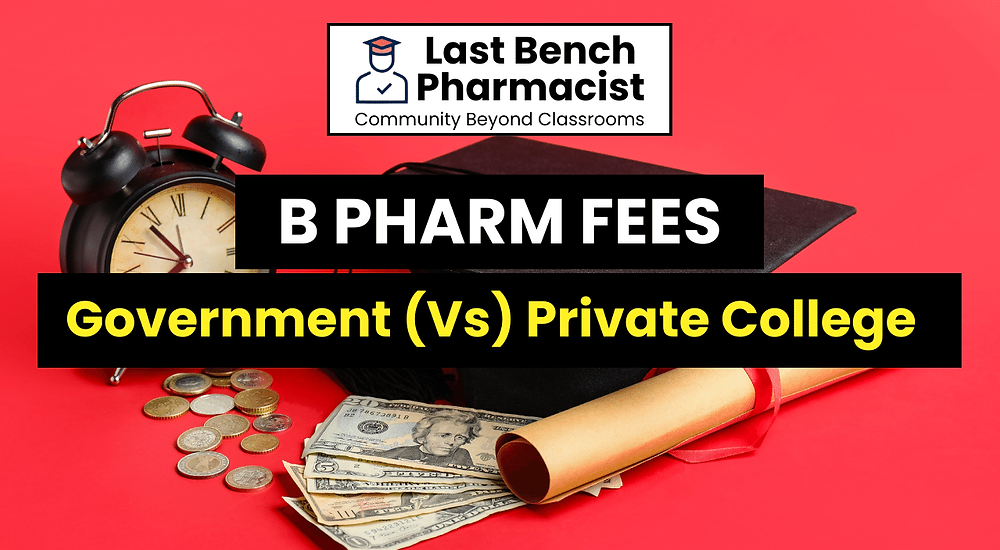



Aspiring pharmacists face the crucial decision of choosing between government and private colleges for pursuing their B Pharma education, with one of the key considerations being the associated fees. And let’s face it, cost plays a crucial role in that decision. So, before diving into the exciting world of pharmaceuticals, let’s demystify the B.Pharm fee structure in government and private colleges. Trust me, this B Pharm Fees in Government (vs) Private College knowledge will empower you to make an informed choice.
The most significant difference lies in the amount itself. Government colleges, blessed with government subsidies, offer significantly lower fees compared to their private counterparts. Here’s a glimpse:
Government Colleges: Expect a range of INR 10,000 to INR 50,000 per year. Remember, this varies depending on the state and college.
Private Colleges: Brace yourself for a wider spectrum, spanning INR 50,000 to a staggering INR 4,00,000 per year. Location, reputation, and facilities significantly impact the cost.
Don’t be fooled by just the tuition fees. Consider these additional expenses:
Hostel Fees: Living on campus adds another variable. Government hostels are usually cheaper, but private hostels can vary widely.
Mess Charges: Food for thought! Government messes tend to be subsidized, while private ones might offer diverse options at a premium.
Books & Stationery: Textbooks and lab manuals aren’t cheap. Prepare to invest in essential academic resources.
Miscellaneous Expenses: Factor in transportation, extracurricular activities, and other incidental costs.
Where you study matters! Metropolitan cities like Mumbai or Delhi generally have higher fees compared to smaller towns. Remember, location influences not just college costs but also living expenses.
Government Colleges: The Pros
If budget is a primary concern, government colleges stand tall. Here’s what attracts students:
Subsidized Fees: The biggest advantage, offering significant financial relief.
Reputed Faculty: Many government colleges boast experienced and qualified professors.
Strong Alumni Network: Tap into a vast network for potential internships and career opportunities.
But Hold On, There’s a Flip Side:
Limited Seats: Competition is fierce, and securing a seat can be challenging.
Infrastructure: Labs and facilities might not always match the latest advancements seen in some private colleges.
Placements: While improving, placement records might not be as robust as some top private institutions.
If you’re willing to invest, private colleges offer certain advantages:
Modern Infrastructure: State-of-the-art laboratories, advanced equipment, and updated libraries enhance the learning experience.
Diverse Curriculum: Some colleges offer specialized programs or industry collaborations, opening doors to unique career paths.
Strong Placements: Many private colleges have dedicated placement cells and boast impressive track records.
Industry Exposure: Internships and collaborations with pharmaceutical companies provide valuable practical experience.
While cost is crucial, consider other factors too:
Your Academic Performance: Aim for colleges that align with your academic strengths and entrance exam scores.
Location Preference: Choose a place that suits your learning style and budget.
Career Aspirations: Research college programs and placements to align with your desired career path.
Both government and private colleges offer scholarships based on merit, financial need, or specific criteria. Explore these options to ease the financial burden.
Ultimately, the choice between a government or private college for your B.Pharm degree is yours. Weigh the financial implications, your academic goals, and career aspirations to make an informed decision. Remember, the right college can pave the way for a successful and fulfilling career in pharmacy.
Bonus Tip: Utilize online resources like Shiksha.com and college websites to compare fees, programs, and placement records. Don’t hesitate to directly contact colleges for specific information.
Join Our Subscribe list to get More Updates!!
No Related Post